

This article is an excerpt from the Shortform book guide to "The 16 Undeniable Laws of Communication" by John C. Maxwell. Shortform has the world's best summaries and analyses of books you should be reading.
Like this article? Sign up for a free trial here.
Does the thought of public speaking make you nervous? Do you have something to say but don’t know how to get your message across?
According to John C. Maxwell, anyone can master public speaking, connect with their listeners, and make a lasting impact with their words by following the 16 laws he’s developed from a lifetime of public speaking. He shares several pieces of advice on how to present a speech confidently and effectively.
Read more for these nuggets of wisdom from Maxwell’s book The 16 Undeniable Laws of Communication.
How to Present a Speech
Maxwell offers three suggestions on how to present a speech effectively: believe in yourself and your audience, read the room and adapt, and inspire people to take action. Let’s look at each recommendation in detail.
Believe in Yourself and Your Audience
According to Maxwell, your mindset, energy, and feelings affect how your audience receives you and your message. The more you believe in yourself and your speaking ability, the more your audience will. To be a more powerful communicator, Maxwell encourages you to adopt two beliefs:
1. Believe in your ability to communicate. Your self-confidence affects how you perform in front of an audience. If you show that you’re nervous, your audience will be more concerned about you than your message. Maxwell suggests you start small and develop a mantra: a short affirming statement to remind yourself that you’re able to communicate well and make a difference with your words.
2. Believe you can help your audience. When you believe your message can positively impact people’s lives, your audience will sense your passion and become more excited about your ideas. Maxwell also suggests believing that your audience wants to learn from you. If you approach your speech with the mindset that people are eager to listen, your words will be more encouraging. On the other hand, if you doubt anyone’s interested in what you have to say, your words may lack conviction and be less persuasive.
Read the Room and Adapt
As we discussed earlier, preparation is essential to communicating your message to an audience. However, this doesn’t mean sticking rigidly to a script. Situations change and unexpected obstacles arise. To communicate well, you must measure how the audience is responding to you and adapt on the spot to engage audiences that are indifferent or distracted.
Before you’re scheduled to speak, Maxwell recommends you get a better sense of how your audience might respond to you by inspecting the location ahead of time and considering the type of event you’re speaking at. Look at factors such as lighting, sound, the location of projector screens, and the overall setup and size of the room. This allows you to rearrange or correct anything or, at the very least, get clues as to whether the audience will be comfortable and engaged or reluctant and unresponsive.
If, during your talk, you read the room and notice that the audience is unengaged, here are a few suggestions on how to recapture their attention on the fly:
1. Interact with the audience. Get the audience to interact by asking questions that require them to shout out answers or raise their hands. You can also encourage them to say or share something with a neighbor.
2. Do something unexpected. If you notice your audience is losing interest, Maxwell suggests you be spontaneous and do something that the audience didn’t anticipate to grab their attention. For example, you could bring your pet or young child on stage if they inspired one of your ideas.
3. Use pauses strategically. Pauses can help emphasize your point and give audience members time to process your message. You can also pause to recapture people’s attention. When you stop talking, people naturally return their focus to you as they wonder what caused the sudden silence.
Inspire People to Take Action
Maxwell writes that the ultimate goal of a speaker is for your audience to take action after hearing your message. Speaking to people doesn’t directly change their lives—your words must drive them to make a change. Maxwell recommends several ways you can convince your audience to take action.
1. Tell personal stories. Encourage people to take action by sharing stories about how you acted upon your advice. Your personal stories can act as proof of how your message works in real life. For example, if you tell your audience to meditate for an hour every day and explain how you came up with your lucrative business idea during one of your meditative sessions, people will be more motivated to heed your advice.
2. Help them visualize the positive change. Paint a picture of what their lives will look like if they act on your message. This gives your audience a glimpse of how they might feel if they take your advice and motivate them to take action.
3. Show them the first step. Maxwell suggests you make it clear how audience members can take the first step, whether it’s practicing better financial habits or improving their relationships. If you only provide the end result, people can feel overwhelmed and unsure of how to reach it. Encouraging people to take the first step is important, Maxwell argues, because action breeds confidence, which empowers people to take further action to improve themselves and their lives.

———End of Preview———
Like what you just read? Read the rest of the world's best book summary and analysis of John C. Maxwell's "The 16 Undeniable Laws of Communication" at Shortform.
Here's what you'll find in our full The 16 Undeniable Laws of Communication summary:
- The secrets to becoming a confident and effective communicator
- How anyone can master public speaking, no matter how nervous they get
- How to write a clear and engaging speech






